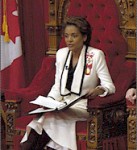Stéphane Dion didn’t know what hit him. One minute he was the leader of Her Majesty’s Loyal Opposition as head of the Liberal Party of Canada, being vilified as a potential banana republic dictator grabbing for the premiership outside of the electoral route; the next he was being swept from his job just as mysteriously as he had got, it – replaced by Michael Ignatieff in a party coup.
Ironic really, because Dion was just shaping to manoeuvre into the premiership on the back of a coalition of the Liberals, the left wing New Democratic Party (NDP) under perennial leader Jack Leyton, and the separatist Bloc Quebecois under Gilles Duceppe. The bedfellows were of the contention that Progressive Conservative Prime Minister Stephen Harper was not reacting effectively to the global economic crisis which crept up on Canada almost unawares as the country had boasted that it was the only member of the developed nations club to be relatively unscathed.
Harper ducked an attempt by his opponents to move a vote of no confidence in his leadership of the country December 5, by calling on the Governor General (head of state) Michaëlle Jean to prorogue parliament (end the current session) December 4, and reconvene in January 2009.
To our neighbours south of the 49th parallel the vicissitudes of Canadian politics over the past few years and the recent weeks in particular have wondered whether they made the correct decision to ditch the Westminster model of parliamentary democracy for their republican style where the constitution is sovereign.
Jon Stewart of the Daily Show was amazed. Can you get rid of a head of government as simple as that? he pondered, hinting at the difficulty of the US ridding itself of the lame duck George Bush presidency; and can a prime minister just shut down parliament to avoid being deposed?
The three parliamentary opposition parties, who, combined hold more seats that Harper’s PCs, conspired to scuttle Harper after his party had won 143 of the 308 seats, the single largest bloc, in an election October 14, and was allowed to form the government.
Suddenly Dion, who was largely viewed by opponents as ineffectual seemed even more decayed than the man who stumbled into the Liberal leadership and fumbled his way through an election campaign that resulted in one of the biggest losses for the part which tends to dominate Canadian national politics.
Dion, a Francophone Canadian born in Quebec, is an bright academic in the field of public administration but his spoken English is not as fluent as his Francophone predecessor, Jean Chretien, in whose cabinet he served as Intergovernmental Affairs minister (1996 -2003) who clarified through questions to the Supreme Court of Canada the conditions under which Quebec could secede.
It is this shortcoming in his language fluency which critics within and outside his party have used to suggest a personality deficiency in decisiveness on the campaign train and in a speech after the Liberals (77 seats), NDP (37) and the Bloc (49) signed a coalition agreement to replace Harper. (There are two independents in the current parliament, that on paper has a life until October 2012.)
While the bloodless coup d’etat would have been perfectly legitimate, there were vociferous protest demonstrations and criticism on the emotional and moral levels with PC supporters arguing the party and Harper had secured a mandate from the electorate who should decide on any new government. The PC also articulated distaste for any government of Canada including the separatist Bloc which contests seats only within the province of Quebec.
On the other hand there were critics of Jean, who acted on Harper’s recommendation to prorogue parliament, suggesting she should have read the times and recognised that Harper had lost the authority to lead.

In most countries within the British Commonwealth, the person who commands the support of a majority of elected members is appointed prime minister. It is legitimate for the opposition to aggregate as a group and name a leader who is recommended to the head of state as the prime ministerial candidate. The incumbent has the options of prorogation of dissolution and calling a new election.
So there was nothing banana republican about the shenanigans in Ottawa. Michaëlle Jean, who was appointed by a previous Liberal administration, and who was tarnished by Conservatives as a closet separatist, serves at the pleasure of the prime minister and acts on his/her recommendation.
She had spoken on her appointment in 2006 of the need for Canadians to go beyond their solitudes and it could well be this Anglo French sucpicion that may have been the undoing of Dion. In addition the country may be losing a chance to allow the separatist Bloc to shift towards fedaral accommodation.












